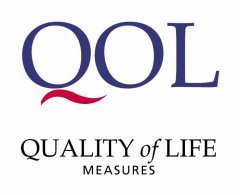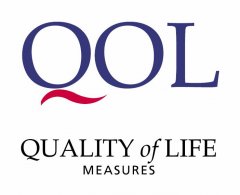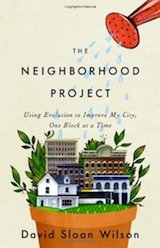

The Evolution Institute connects the world of evolutionary science to the world of public policy formulation. For any given policy issue, we bring evolutionary experts together with other experts for a respectful and constructive dialogue, resulting in a new agenda for basic scientific research, policy formulation, and policy implementation. We have a rapidly expanding portfolio of projects, from early childhood education to the worldwide economy, and we welcome new partnerships with both individuals and organizations.
EDUCATION

Childhood education was our first focal topic, as described in the chapter of The Neighborhood Project titled "Learning from Mother Nature About Teaching Our Children". It also established the procedure for all of our focal topics, which begins by identifying the experts who are already employing an evolutionary perspective, bringing them together with experts who do not yet employ an evolutionary perspective, assessing the current state of knowledge, formulating an agenda of future research and policy implementation, and staying involved over the long term to realize the objectives. Both Jerry Lieberman and David Sloan Wilson are actively working with schools in our respective cities of Binghamton and Tampa. David's effort resulted in a program for at-risk high school students that works for a small fraction of the cost of Geoffrey Canada's Harlem Children's Zone, as reported in this scientific journal article and this commentary recently published in Education Week. This program is validated with the gold standard of assessment, the randomized control trial. Jerry is working with a school and community center run by a charismatic black pastor, illustrating the degree to which the Evolution Institute's approach can appeal even to devout religious believers. To summarize--evolution can provide a unifying theoretical framework for a practical topic such as education, no less than an academic topic such as religion. The practical benefits are inestimable.

ECONOMICS
Our focus on economics began with the financial collapse of 2008, as described in the chapter of The Neighborhood Project titled "Evonomics". It involves a partnership with the National Evolutionary Synthesis Center (NESCent), one of the National Science Foundation's largest evolution-related centers. The collaboration began with a conference in 2009 and continues with a series of four workshops that has been meeting over a period of two years. One product is an anthology that will be published by the University of Chicago Press titled Evonomics: Evolutionary Theory as a New Theoretical Foundation for Economics and Public Policy. Another product is a special issue of the highly respected Journal of Economic and Behavioral Organization (JEBO) that is in preparation. This review article that will begin the special issue shows how evolution can be presented as a general theoretical framework in a way that is respectful of other perspectives and fully cognizant of the entwined histories of evolution and economics as disciplines. This white paper submitted to NSF is a consensus document with 64 signatories, including luminaries such as E.O. Wilson and Nobel laureate Elinor Ostrom, illustrating the degree to which we are capturing the intellectual high ground for this subject.

RISKY ADOLESCENT BEHAVIOR
Bruce Ellis is a distinguished evolutionary developmental psychologist who participated in our education workshop. He was so impressed that he suggested organizing a workshop on risky adolescent behavior, which was held at the University of Arizona in 2009. One product of the workshop is a forthcoming special issue of the elite journal Developmental Psychology, which begins with the attached major review article titled "The Evolutionary Basis of Risky Adolescent Behavior: Implications for Science, Policy, and Practice". This is another example of how we are capturing the intellectual high ground, by involving the most distinguished scientists and publishing in the most distinguished academic journals. Capturing the intellectual high ground is crucial both for deriving policies that work and for establishing authority in public and political discourse. We are continuing to work with Bruce to fund a consortium of research groups conducting comprehensive longitudinal research on a model of human development that they call "the adaptive calibration model of stress responsivity".

QUALITY OF LIFE FROM AN EVOLUTIONARY PERSPECTIVE
Jerry has added his lifelong experience as a community organizer and introduced me to urban planners such as Ken Reardon, who heads the Urban Planning department at the University of Memphis. The "field site" approach is so appealing that some of my evolutionist colleagues are eager to get involved in cities such as Newcastle (UK), London (UK), and Singapore. A workshop that Jerry organized on Quality of Life from an evolutionary perspective, which was held in Memphis, engaged organizations such as the United Nations Research Institute on Social Development and the International Society for Quality of Life Studies. All of this has led to an ambitious plan to create a consortium of cities as field sites for measuring, studying, and improving the quality of life.

FAILED STATES AND NATION BUILDING

EVOLUTIONARY MISMATCH AND WHAT TO DO ABOUT IT

SOCIAL EVOLUTION FORUM
The Social Evolution Forum has three dimensions. First, it is a virtual seminar, that is, a website dedicated to promoting the presentation and discussion of the most novel and important questions in social evolution theory. Second, it has live podcasts and congresses/meetings dedicated specifically to the aims of the SEF. And third, although fundamentally a communication network, the SEF also provides the foundations for inter- and pluri-disciplinary – and, ultimately, trans-disciplinary – collaboration. This takes the form of adverts to international funding opportunities, and the posting or publication of interim reports for specialists and for the broader community interested in social evolution.
We believe that The Social Evolution Forum will have a considerable impact on interdisciplinary research in social evolution theory, and will contribute to informing and educating the public about pressing issues of today’s society.

EVOLUTION: THIS VIEW OF LIFE
Our newest venture is EVOLUTION:THIS VIEW OF LIFE, an online general interest magazine in which all of the content is from an evolutionary perspective. A pilot version is already active and a redesigned version will be launched and publicized on Darwin’s Birthday (Feb 12) 2012. The mission of the magazine is to do for the general public what EvoS does for higher education, the Evolution Institute does for public policy, and the Binghamton Neighborhood Project does for community-based research. It is the creation David Sloan Wilson's graduate students named Robert Kadar, who serves as managing editor. David serves as Editor-in-Chief and the magazine has a staff of eleven section editors, all of whom are professional evolutionists. That gives the magazine more scientific authority than any other popular science outlet, including Scientific American and Discovery. EVOLUTION:THIS VIEW OF LIFE has tremendous potential for changing the way that the public thinks about evolution.
MESSAGE FROM THE PRESIDENT:
The mission of the Evolution Institute is to provide a conduit from the world of evolutionary science to the world of public policy formulation. Just as any human-related topic can be studied academically from an evolutionary perspective, virtually any important policy issue can be approached from an evolutionary perspective. This seemed like a bold conjecture when Jerry and I started the Evolution Institute in 2006, but by now I am convinced that evolutionary science can function as a practical toolkit for improving the quality of life, in addition to the academic understanding that it provides. My conviction is based on the focal topics already addressed.
With respect to infrastructure, our strategy for developing the Evolution Institute has been to focus first on selected topic areas as a proof of concept for the organization as a whole. Having accomplished that goal, we are now in the process of raising funds for a small staff and general operating budget. It’s amazing what we’ve accomplished on our own, like an incipient ant colony in which the founding queens do all the work, but I look forward to reaching the stage in which there are workers providing the benefits of division of labor!
Armed with guidelines, we will evaluate case studies with a high degree of practical relevance for both humans and non-human species. Examples include a) immune system dysfunctions; b) human 4 diet; c) human behavioral decisions; d) learning and cultural evolution, which are open-ended processes that like the immune system can become “confused” in modern environments; e) “ecological traps” that cause nonhuman species to make maladaptive choices; f) nonhuman species in urban and suburban environments. For each case study, we will outline a research agenda for rigorously establishing the phenomenon of mismatch and devising environmental interventions for achieving practical solutions. Our focus on “what to do about it” will give this working group immediate practical relevance in addition to its basic scientific import.
Why people cooperate in constructing larger social units, and its reverse, social disintegration,have been studied intensively from the perspective of cultural and social evolution. So far, however, the insights coming from this research have not been integrated into our understanding of how to deal with failed states or succeed in nation-building. To jump-start such a dialogue between scientists and policy makers, the Evolution Institute organized a workshop at Stanford University on December 3–5, 2011. This workshop brought together academic experts from such diverse fields as evolutionary, social/political, and historical sciences with diplomats and policy makers. The workshop focused on a particular region where ideas on how to achieve for peace are urgently needed, Afghanistan and Pakistan.
David Sloan Wilson
The Evolution Institute connects the world of evolutionary science to the world of public policy formulation. For any given policy issue, we bring evolutionary experts together with other experts for a respectful and constructive dialogue, resulting in a new agenda for basic scientific research, policy formulation, and policy implementation. We have a rapidly expanding portfolio of projects, from early childhood education to the worldwide economy, and we welcome new partnerships with both individuals and organizations.
Thanks to Jerry Lieberman's guidance, we expect to receive 501c3 status in early 2011 and will be formalizing our organizational structure in terms of an executive board and a number of advisory boards.
We are delighted to announce that Peter Turchin has joined the EI as Vice President. Peter is Professor of Ecology and Evolutionary Biology with a joint appointment in Mathematics at the University of Connecticut. In addition to his distinguished career in mainstream evolutionary science, he is pioneering the quantitative study of human history in books such as War and Peace and War: The Rise and Fall of Empires, Historical Dynamics: Why States Rise and Fall , and Secular Cyles (with Segey Nefedov). Peter’s expertise nicely complements my own in the selection and development of focal projects, including a new project on failed states and nation building that will be described in more detail below.





For all of our focal projects, we expect to stay involved over the long term to help implement the research and policy recommendations that emerge from the initial workshops. Our first workshop on early childhood education (held November 2008) inspired Bruce Ellis, who holds the John & Doris Norton Endowed Chair in Fathers, Parenting and Families at the University of Arizona, to organize a similar workshop with us on the topic of risky adolescent behavior (held October 2009), which is now being written up as a special section of the journal Developmental Psychology.
A partnership with the National Evolutionary Synthesis Center (NESCent), the National Science Foundation’s largest evolution-related center, is blossoming in a number of ways. A conference titled “The Nature of Regulation: How Evolution Can Inform the Regulation of Large-scale Human Social Interactions” (held November 2009) led to a contract with the University of Chicago Press for an anthology with original essays introducing each section titled Evonomics: Evolutionary Science as a New Foundation for Economic Theory and Policy. My co-editor for this project is Geoffrey Hodgson, one of the foremost authorities on evolution in relation to economics. For a preview of the new foundation, see Geoff’s recently publishedDarwin’s Conjecture: The Search for General Principles of Social and Economic Evolution (with ThorbjornKnudsen) and my 13-part series titled “Economics and Evolution as Different Paradigms” on my Evolution for Everyone blog.
Another outcome of the “Nature of Regulation” conference is a two-year project funded by NESCent that continues to explore economic theory and policy from an evolutionary perspective. Our first meeting was held in August 2010 and we will be adopting a case study approach, whereby the advantages of the evolutionary “toolkit”, as we are beginning to think about it, are respectfully compared to the toolkits offered by other theoretical frameworks for specific policy issues.
NESCent has also funded a second two-year project titled “Evolutionary Mismatch and What to Do AboutIt.” Adaptations to past environments can tragically malfunction when the environment changes. Myriad problems can be attributed to mismatch, not only for humans but for other species living in human-altered environments. Cultural adaptations can become mismatched in changing environments, just as much as genetic adaptations. We will thoroughly consider the problem of mismatch, starting with the scientific fundamentals and leading to practical recommendations for how to rigorously identify cases of mismatch and what to do about them on a case-by-case basis. This project will be coordinated with other NESCent projects on medicine and health from an evolutionary perspective, taking the EI in the direction of focal topics such as obesity and immune system dysfunctions.

A workshop titled “Evolution, Ethics, and Public Policy” will be held in late April 2011 in collaboration with the Prindle Institute for Ethics at DePauw University. This workshop is critical for the mission of the EI for two reasons. First, evolution became stigmatized in relation to human affairs in part because it was used to justify social inequality, leading to policies that are ethically highly problematic. It is important to be mindful of the past, to show that evolution is not inherently biased toward such policies, and in fact provides a strong argument for social equality. Second, one objective of the workshop is to create an infrastructure for examining the ethical implications of all the policy issues considered by the EI. The John Templeton Foundation has become interested in this project and will send a number of representatives to see if a “new evolutionary ethics” might become part of their mission to “serve as a philanthropic catalyst for discoveries relating to the Big Questions of human purpose and ultimate reality.”

Other workshops in the planning stages for 2011 include one on quality of life with a focus on the workplace and another on the cultural evolution of large-scale human societies with a focus on the modern problems of failed states and nation building. Funds have been raised for both projects and we are currently assembling the evolutionary expertise and venue.

Our influence is also becoming international, including trips to the UK, Iceland, Australia, and New Zealand during 2010. A workshop titled “Evolving the Future: An Exploration of How Evolutionary Thinking Can Inform Public Policy” was organized with philosopher of biology Paul Griffiths and held in Sydney, Australia in September 2010. The participants included Sir Peter Gluckman, New Zealand’s chief science advisor and authority on Darwinian medicine. This workshop will probably result in a project on obesity that not only will address this important subject from an evolutionary perspective, but will carefully examine how the evolutionary toolkit guides inquiry, compared to the toolkits provided by other theoretical frameworks.

My next trade book, titled The Neighborhood Project: Using Evolution to Improve My City, One Block at a Time, is finished and will be published by Little, Brown in the summer of 2011. It conveys the evolutionary paradigm to a broad audience, including the formation of the EI and several of its projects. Every author hopes that their book will become a best seller; in my case, I also have high hopes that The Neighborhood Project will attract widespread attention to the EI and its mission.
Message From the President:
I hope you agree that 2010 was a very good year! I will end this report by reflecting upon what the future holds in store for us.
When Jerry and I started the EI in 2007, the overriding question was whether evolutionary science had anything to contribute over the short term or if a long academic lag time would be required. After all, the human-related academic disciplines are only newly being approached from a modern evolutionary perspective. Major public policy issues such as health, education, social welfare and the economy have already received an enormous amount of attention from more established perspectives. Wasn’t it presumptuous to think that we could succeed merely by looking at these old problems in a new way? Reviewing our progress as of 2010, I am confident that evolutionary science can make a meaningful contribution to virtually any public policy issue from the very beginning—not only in terms of what it has already been discovered from an evolutionary perspective, but in terms of the theoretical and methodological toolkit that it offers for future inquiry.
Now the overriding question is how fast we can become a permanent organization with the capacity to fill a vast vacant niche. We have succeeded spectacularly at the level of single projects, both in terms of raising funds for workshops and the progress made on their basis. What we need, in addition, is to raise funds to hire a staff and to relieve Peter and me of some of our professorial duties so that we can concentrate on developing the EI to its full potential. Consider that there is currently no mechanism whatsoever to connect the world of evolutionary science to the world of public policy formulation. Consider further that there are powerful and well-funded organizations, such as the Discovery Institute, whose mission is to spread misinformation about evolution. If the EI could become an organization on a par with the Discovery Institute, the effect on general attitudes toward evolution would be transformative. It has been said that science is widely accepted as soon as it becomes engineering. The reason that physics and chemistry are widely accepted is not because they are better supported by facts than evolution, but because they are so eminently useful in daily life. Evolution will become widely accepted as soon as it is shown to be useful in daily life and not before. The mission of the EI is to accomplish that transformation.
In this regard, I would like to acknowledge the support of Bernard Winograd, Executive Vice President and Chief Operating Officer, US, of the Prudential Corporation. Bernard is a longtime supporter of the National Center for Science Education, which heroically fights to keep evolution in the public school curriculum, and took an interest in the EI from its inception. Not only has he contributed to the general operating budget of the EI, including a portion of my salary to reduce my professorial duties, but he has taken a strong intellectual interest in the projects and added his considerable expertise by attending the “Nature of Regulation” conference held in 2009. We also acknowledge the on-going support from the Aaron and Martha SchecterPrivate Foundation and Robert and James Stephen. Their support has been essential in supporting our workshops at the University of Miami and Arizona. They are also providing the foundation for next yearsworkshop at Stanford and for the one on Quality of Life. The host university for this project will soon be announced. We believe that other leaders with a strong interest in science, evolution, and public policy will join Bernard, the Schecters and Stephens by becoming involved in the support and operation of the EI.
Sincerely,
David Sloan Wilson


Back Next
 Magazine Posts
Magazine Posts Table of Contents
Table of Contents